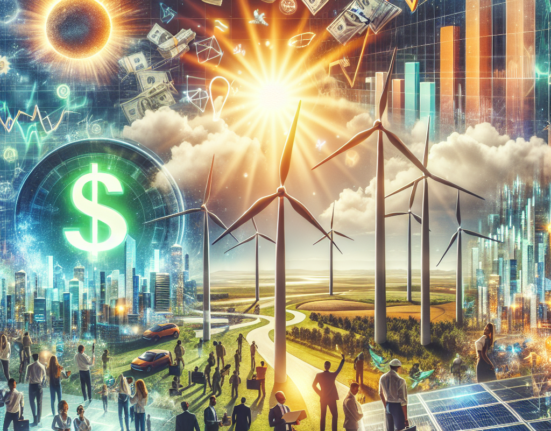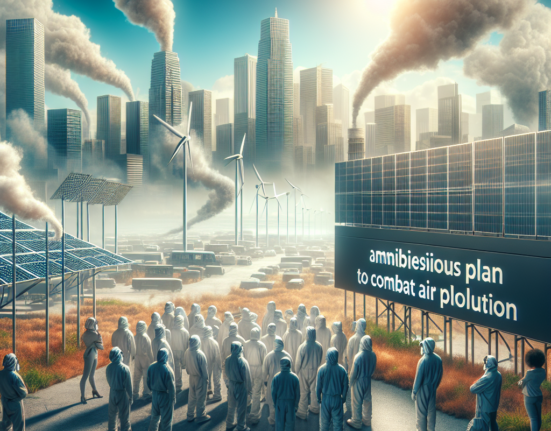The Sustainable Tech Revolution: Innovations Driving Environmental Change
In recent years, the call for sustainable practices has transcended from a niche concern to a global imperative. This shift is markedly evident as industries across the spectrum grapple with the climate crisis, resource depletion, and environmental degradation. At the forefront of this shift is a burgeoning wave of sustainable technology innovations – groundbreaking developments poised to mitigate environmental damage and foster a greener future.
Renewable Energy Solutions: The Dawn of a New Era
Perhaps the most dynamic driver in the sustainable tech arena is the advancement in renewable energy technologies. Solar and wind energy continue to break new grounds, harnessing the abundant natural resources in increasingly efficient ways. Solar panels are now more efficient and affordable than ever before, reaching a pivotal point where solar energy is becoming competitive with traditional fossil fuels. Advances in wind turbines, with innovations like floating offshore wind farms, are expanding the scope and scalability of wind energy, making it a viable option even in deep-water regions.
Battery Storage: Powering the Future
Integral to the success of renewable energy is the parallel advancement in battery storage technology. The development of high-capacity, long-duration batteries is transforming how electricity can be stored and used. Companies are investing heavily in research to create batteries that are not only capable of sustaining power grids through the intermittent nature of renewables but are also cost-effective and environmentally friendly. Innovations such as solid-state batteries and second-life EV batteries are paving the way for reliable and sustainable energy storage solutions.
Electric Mobility: Greener Transportation
The transportation sector, a notorious contributor to greenhouse gas emissions, is witnessing a seismic shift with the rise of electric vehicles (EVs). From compact cars to freight trucks and even airplanes, advancements in EV technology are drastically reducing the carbon footprint of personal and commercial travel. The development of charging infrastructure, with fast-charging networks and solar-powered stations, is making electric mobility more accessible and convenient. Additionally, autonomous and shared mobility solutions are on the horizon, promising to streamline traffic flow and reduce overall emissions.
Smart Grids: Revolutionizing Energy Distribution
The concept of the smart grid is revolutionizing how energy is distributed, managed, and consumed. By utilizing advanced information and communication technologies, smart grids provide real-time monitoring and management of electrical networks, optimizing energy efficiency and reducing waste. These intelligent systems can integrate various renewable energy sources, balance supply and demand dynamically, and empower consumers with real-time usage data to make informed choices about their energy consumption.
Circular Economy: Redefining Waste and Resource Management
Another pivotal aspect of the sustainable tech revolution lies in the adoption and promotion of the circular economy model. This innovative approach reimagines the life cycle of products, emphasizing reuse, recycling, and the reduction of waste. Technologies enabling material recovery, such as advanced sorting systems and chemical recycling, are instrumental in transforming waste into valuable resources. Additionally, innovative manufacturing processes like 3D printing and modular design are minimizing material usage and extending product lifespans.
Agri-Tech: Sustainable Farming for a Growing Population
Agriculture, a critical yet resource-intensive industry, is also benefiting from technological innovations aimed at sustainability. Precision farming, powered by IoT, AI, and drone technology, allows for optimized use of water, fertilizers, and pesticides, significantly reducing environmental impact. Vertical farming and hydroponics are emerging as efficient methods to produce food in urban settings, requiring less land and water compared to traditional farming. These advancements are crucial in meeting the growing food demands of a burgeoning global population while preserving the planet’s ecosystems.
Green Building Technologies: Constructing a Sustainable Future
The built environment is undergoing a transformation with the advent of green building technologies. Innovative materials like cross-laminated timber and recycled plastics, alongside energy-efficient systems such as passive solar design and advanced insulation, are reducing the carbon footprint of buildings. Smart home technologies, with integrated energy management systems, enhance energy conservation and provide occupants with greater control over their environmental impact.
Conclusion: A Collective Effort for a Sustainable Future
The sustainable tech revolution is more than a confluence of innovative technologies; it represents a collective endeavor to safeguard our planet for future generations. Governments, businesses, and individuals each play a crucial role in fostering and adopting these technologies. As we stand on the cusp of this green revolution, it is essential to remain vigilant and proactive, continuously pushing the boundaries of what is possible in the realm of sustainable technology. Together, we can drive profound environmental change and embark on a path toward a greener, more sustainable future.















